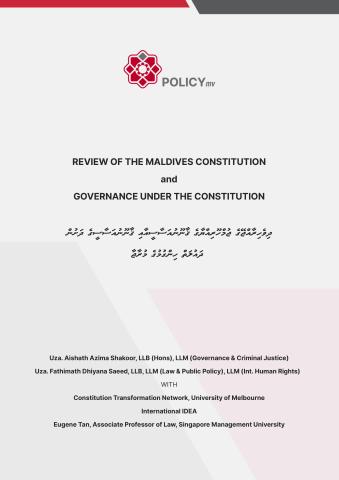
Beyond the promise of democracy: Reviewing the Maldives’ 2008 Constitution
![Dr Fawaz Shareef, Founder of Maldives Centre for Policy Studies; Uza. Aishath Azima Shakoor; Uza. Fathimath Dhiyana Saeed. [Photo: Maldives Centre for Policy Studies]](/sites/default/files/styles/webp_1024/public/2024-08/WhatsApp%20Image%202024-08-06%20at%2011.48.48.jpeg.webp?itok=cp8XOF4R)
The 2008 Constitution marked a new era of governance in the Maldives, paving the way for the country’s first multiparty elections, separation of powers, protections for human rights and stronger accountability institutions. Sixteen years later, however, there is a concern that the 2008 Constitution has not lived up to its promise, with signs of democratic decline, expanding executive power and the politicisation of independent institutions.
Two former Attorneys-General of the Maldives, Uza. Aishath Azima Shakoor and Uza. Fathimath Dhiyana Saeed, are leading an independent review of the 2008 Constitution to analyse provisions of the Constitution and their implementation in practice and recommend reforms.
“Our work intends to examine the principles set out in the Constitution and the developments in the administration of the state and the implementation of the Constitution and to highlight the changes that need to be made to the legal system in achieving our vision of what the future should be.” - Aishath Azima Shakoor.
The review was launched in Male on 4 August 2024, at an event attended by the Speaker of Parliament, Former President Waheed who is now Chair of Maldives Centre for Policy Studies, the Chancellor of the Maldives National University and members of the academy, legal profession, media and civil society.

International IDEA is proud to support this review of the Maldives Constitution, working with the distinguished lead authors and experts from the University of Melbourne and the Singapore Management University to provide comparative constitutional insights and knowledge to inform the review.
The review will set out the history of the process for democratization and constitution making that resulted in the 2008 Constitution, collecting together the insights of key participants in the process. Drawing on research and consultations with key stakeholders and the wider public, the review will examine critical areas of constitutional governance, including human rights protections, parliamentary autonomy, executive power and accountability, judicial independence, the governance of national assets, and decentralization and local governance. It will also focus on cross cutting issues, such as the challenges of climate change for the small island state, gender balance in political representation and governance, and crime and social justice.




